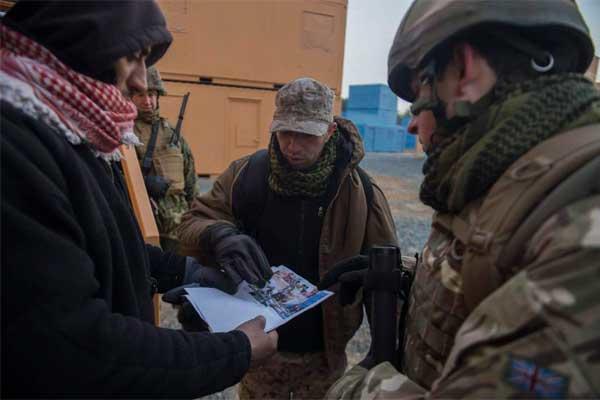As the Marine Corps looks to prepare for future conflicts and expand key highly skilled communities, the service will consider adding a new primary military occupational specialty: 0521, Military Information Support Operations.
A briefing document obtained by Military.com proposes expanding what is now a free, or additional MOS, into a primary MOS and increasing the total number of MISO Marines from 87 to a steady state of 322. The enlisted-only MOS would be composed chiefs of sergeants and staff sergeants, with a tapering senior enlisted leadership structure.
MISO, which has also been called psychological operations, or PSYOP, aims to influence emotions and behavior by targeted messaging and information distribution. It requires an understanding of the people and cultures with whom Marines will interact and how they are affected by various communication strategies. Humvees equipped with loudspeakers that blast messages to communities, leaflet information campaigns, and one-on-one meetings with local leaders all fall under the umbrella of MISO.
Currently, the Marine Corps deploys its small community of MISO Marines in teams of two to four aboard Marine expeditionary units and its special purpose Marine air-ground task forces for Africa and the Middle East. They also support elite operations at Marine Corps Forces Special Operations Command and assist in major exercises and sometimes with larger Marine force operations.
The MISO MOS brief, prepared in October 2015 by Col. Drew Cukor, commanding officer of Marine Corps Information Operations Center in Quantico, Virginia, which contains the MISO program, notes that U.S. adversaries have seen success in exploiting the "information environment" to their own advantage.
"[Marines] may win physical battles but still lose because of failure to fight effectively in the cognitive dimension," Cukor notes.
Creating a MISO primary MOS would allow the Corps to get more value from the investment it makes training its Marines, the brief notes. Currently, about 30 Marines a year complete a 17-week training course at Fort Bragg, N.C. at a cost of $12,000 per student, plus another $5,000 per Marine to obtain a required Top Secret/Sensitive Compartmented Information clearance. Total training costs add up to more than $600,000, according to the brief.
However, few MISO Marines remain in the community, with 80 percent choosing to end active service following their three-year tour in the free MOS.
In an award-winning Dec. 2015 essay published by the U.S. Naval Institute's Proceedings Magazine, Marine Sgt. Dion Edon, a MISO Marine, said that those in his community tended to seek out other opportunities after their three-year tours because there was little incentive to stay.
"The Marine Corps loses an Army Special Operations Forces–trained Marine to the civilian contracting world, Army SOF, or the fleet, where their MISO-specific knowledge is unavailable," he wrote. "The MISO MOS should become a primary MOS with warrant and limited-duty officer opportunities so that the Marine Corps can retain its investment in behavioral experts who can support senior-level staff with technical expertise and advice."
Edon, who recently returned from a deployment supporting the 15th MEU as a MISO noncommissioned officer, also proposed giving MISO Marines more regionally focused and language specific training, and incorporating them further into Marine Corps planning and wargaming operations.
He quoted 15th MEU commanding officer Col. Vance Cryer, who said the addition of the MISO capability aboard the MEU had resulted in a "much more refined" approach to the integration of intelligence with operations.
"The MISO mission and support provides me [with] critical context, insight, and validation of various levels of information for use in the planning and execution phases," Edon quotes Cryer as saying in the essay. "As a key part of a networked organization, it provides timely, value-added tools that enable asymmetric advantages to the MEU or MAGTF level of operations."
Expanding the community would also better allow MISO Marines to meet high operational demand and increase the number of MISO personnel available to serve within each Marine expeditionary force and at MARSOC, Cukor's brief shows.
Officials with Marine Corps Information Operations Center declined requests for an interview because the plans were pre-decisional.
But the deputy commandant of Marine Corps Manpower and Reserve Affairs, Lt. Gen. Mark Brilakis, told Military.com that preliminary decisions could be made as soon as this fall regarding how to develop the MISO community.
"In MISO, within those specialties and capabilities, I think those are some of the things that we're going to be wrestling with to determine whether or not the Marine Corps needs more structure, whether it becomes a primary MOS, whether it becomes an expanded MOS, or whether it becomes a series of MOSs, depending upon the specific specialties," he said. "So if individuals are interested in MISO and expanded realm of information operations, etcetera, then they should stand by, because I think more will come out of this."
He noted that Marine Corps Commandant Gen. Robert Neller has directed Lt. Gen. Robert Walsh, commanding general of Marine Corps Combat Development Command, to conduct a study that defines where the Marine Corps needs to be in 2025 and whether the force is properly organized to address future challenges.
"One of the larger discussion areas is in cyber, information, deception, psychological operations, where is the Marine Corps with those capabilities, that structure, that capability inside the force," he said. "So there will be a fairly robust discussion about where we sit today, and where we may want to go tomorrow."
Brilakis declined to speculate whether the Corps could add even more MOSs, but said many decisions had yet to be made.
This push for a MISO primary MOS comes as Neller pushes to expand certain Marine Corps communities, including information and cyber warfare. He told an Atlantic Council audience in February that the Corps had two options in light of this objective: to ask for an end strength increase, or to restructure, perhaps shrinking other communities such as infantry, to realize growth in others.
-- Hope Hodge Seck can be reached at hope.seck@monster.com. Follow her on Twitter at @HopeSeck.



























